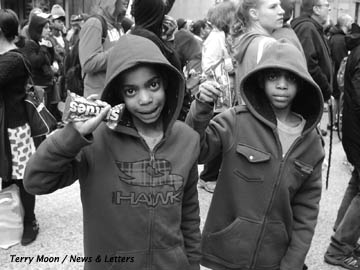|
NEWS & LETTERS, May-June 2012
Justice for ALL the Trayvon Martins
Los Angeles--Protests against the murder on Feb. 26 of unarmed 17-year-old Trayvon Martin by George Zimmerman, an armed neighborhood watch volunteer in a gated community in Sanford, Fla., exploded across the U.S. Zimmerman, who remained free for weeks, claiming he killed Martin in "self-defense" and hiding behind Florida's Stand Your Ground law, was finally arrested
for Trayvon's murder on April 11.

There were many protests in Los Angeles, including
at Leimert Park in a Black community, and downtown. On April 9, a crowd of about 500 Blacks with support from white and brown activists gathered in Persian Square downtown. We listened to music, signed letters of protest, had small discussion groups and heard speakers, including activists from different organizations, and several Black actors. We marched for six blocks in silence to City Hall where a short rally was held. A woman organizer said: "This is not just a march, it's a movement!"
Though this demonstration was smaller by several thousand than the ones for Trayvon a week or two earlier,
what made it important is that it included protests against many other unarmed victims of police killings. There were multiple signs with the name and photo of each victim and the words "Justice for Trayvon Martin" above their website: www.mhoodies.org.
The next day, April 10, several Black groups organized
a rally at the Pasadena City Hall protesting the recent killing of Kendrec McDade, an unarmed 19-year-old college student, by the Pasadena police. McDade was shot on March 24 after a false report that he had robbed a person at gunpoint.
A Black woman speaker said this is not a war against the Pasadena police: "We just want justice." McDade's father said, "I've been in Pasadena for a long time seeing this happen over and over. Someone has to be held accountable."
Protestors held signs for Martin and for McDade and over ten other unarmed youths killed by the Pasadena
police, including a woman, all of whom were Black except for one Latino youth. Occupy L.A. and L.A.'s Occupy
the Hood were among groups supporting this action.
There are a tremendous number
of things that go on where nobody
does anything. Then something sparks people like the murder of Trayvon Martin. Now there are demonstrations
everywhere, and people are starting to talk about all those other shootings, mostly targeting young Black men.
--Basho
* * *
Chicago--On Saturday, March 24, 300 or more people--Black and white, young and old--rallied downtown to show support for Trayvon Martin's parents and to put our bodies in the street to protest the rising racism in the U.S. We wore hooded sweatshirts and many carried bottles of iced tea and packages of Skittles to show our solidarity with the unarmed Trayvon Martin, gunned down by neighborhood
watch volunteer George Zimmerman
a month before, yet cleared by police.
The speakers' platform had a large banner: "Killed by police: STOLEN LIVES," with many pictures attached to it, reminding us all that what happened to Trayvon was far from an isolated event. People put their hearts on their signs: "Only in America can you MURDER a child and get away with it. But you kill a dog and you receive jail time"; "The Florida 'Stand your ground law' is nothing but a modern day LEGALIZED LYNCHING LAW."
A young Black woman's sign read, "Am I next to die?" Another read, "It is not a crime to be Black!" and another what so many felt, "This child was our child."
Speaker after speaker decried the racism that, unchecked, leads to so many deaths. Most speakers noted how common being stopped for being Black has become.
On the previous afternoon 150 people marched two by two from Millennium Park to the ABC-TV studio and around the Loop. The marchers were mostly young people, all in hoodies, and were racially mixed with about three-fourths of them Black.
The marchers had eagerly taken and read copies of News & Letters and waved them along with Skittles as we called for justice for Trayvon. The Los Angeles mother's account of her son Jonathan Cuevas' execution by sheriff's deputies in the March-April issue showed eerie similarities to Trayvon's killing 2,500 miles away: official protection of the killer and ignoring pleas of the victim's family for facts and for simple justice.
The spirit of the crowds on both days was sad and somber, as well as angry and determined. We all know that Trayvon's tragic death was not just an indictment against the man who pulled the trigger, but that his murder put all of American civilization on trial.
--March participants
|

